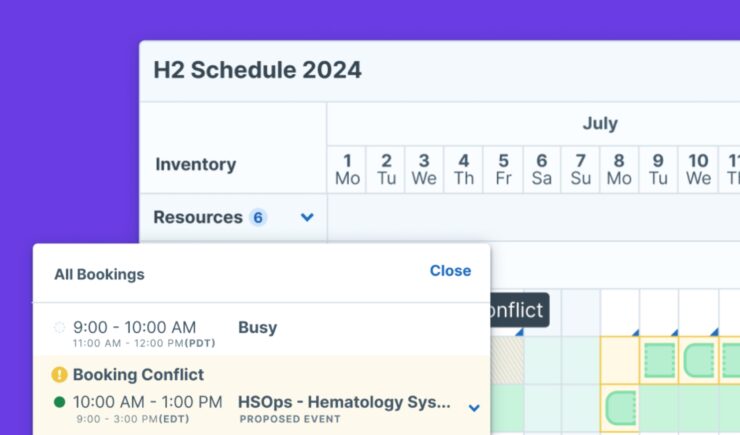Classroom training programs become increasingly difficult to manage as they grow in size and complexity. Training managers often have to coordinate multiple instructors, assign resources, book facilities, and manage learners across different locations—all while adhering to strict schedules. Complex training scenarios, such as multi-day events, multi-location sessions, or blended formats, only add to this burden. The more intricate the operation, the higher the risk of scheduling conflicts, missed tasks, and administrative errors. Without the right tools, managing these complexities can overwhelm even the most experienced teams.
That’s where Course Templates from Administrate come into play. Course Templates help training managers maintain control by automating administrative workflows, standardizing processes, and simplifying resource coordination. This blog explores how Course Templates eliminate chaos, allowing organizations to handle complex training smoothly while boosting training efficiency.
Understanding the Complexity of Training Operations
Unlike online learning, classroom training involves numerous logistical challenges. Every session requires the right combination of instructors, rooms, equipment, and materials, all of which need to be available at specific times and locations. For example, a single training session might require:
- Qualified instructors with specific certifications.
- Specialized equipment, such as simulators or medical devices.
- Multiple rooms, each with different setups.
- Learners with pre-requisite qualifications or certifications.
As programs scale, managing these logistics manually becomes impractical. A multi-day session may involve different instructors and equipment on specific days, or a single training program might need to run concurrently across several locations. Without automation, this complexity increases the likelihood of errors and miscommunication, disrupting the flow of training operations.
How Course Templates Simplify Complex Training Scenarios
Administrate’s Course Templates provide a scalable solution for managing complex training. By automating key training tasks and standardizing processes, Course Templates ensure consistency across sessions and free up time for managers to focus on strategic goals.
1. Multi-Location Scheduling Made Simple
Running the same course across different locations requires precise coordination. Course Templates allow training managers to pre-set schedules for each location, ensuring all sessions align with local requirements. For example, a company might need to deliver compliance training simultaneously in multiple countries, each with different time zones and instructor availability.
With Course Templates, managers can create location-specific schedules within the same framework. Once the template is configured, new sessions for each location can be generated in just a few clicks, with all the relevant logistical details—such as room bookings and resource assignments—automatically applied.
2. Automated Resource Allocation
Managing equipment and facilities across multiple sessions is one of the most time-consuming aspects of classroom training management. Course Templates streamline resource allocation by automating the booking process. Each template includes predefined resource requirements—such as rooms, projectors, or training devices—which are assigned automatically when a new session is scheduled.
For example, consider a technical training program that requires both a computer lab and specialized tools. The Course Template ensures these resources are booked in advance for every session, eliminating last-minute scrambles and preventing double bookings. This automation not only saves time but also ensures that resources are used efficiently.
3. Pre-Assigned Instructor Workflows
Coordinating instructor availability is a major challenge in complex training environments, especially when instructors are spread across multiple locations. With Course Templates, training managers can create a list of approved instructors for each course based on qualifications and availability. The system then automatically matches available instructors to upcoming sessions.
For example, if a course requires an instructor with advanced certifications, the template filters the instructor pool to only show qualified personnel. If scheduling conflicts arise, the system highlights these issues in advance, allowing managers to reassign instructors without disrupting the schedule. This reduces the administrative burden and ensures that the right people are assigned to the right sessions every time.
4. Automated Communication and Task Workflows
Effective communication is critical in managing training operations. Instructors, learners, and support staff need to stay informed about schedules, requirements, and updates. Manually sending reminders and notifications can be overwhelming, especially for large or complex training programs. Course Templates automate this communication through pre-configured workflows.
For example, reminders can be set to notify learners of upcoming sessions a week before they begin, while instructors receive task lists outlining their responsibilities for the course. Managers can also automate follow-up emails to send surveys or certificates after the training is complete. These workflows ensure that no communication is missed, improving the overall experience for both learners and instructors.
The Benefits of Using Course Templates for Complex Training
1. Increased Efficiency and Reduced Errors
Automating training tasks through Course Templates reduces the chance of errors and ensures every session is well-prepared. Managers no longer need to manually assign instructors, book rooms, or track equipment. With these tasks automated, training operations become more efficient, allowing teams to focus on delivering high-quality training.
2. Scalable Training Solutions
Course Templates make it easier to scale complex training programs across multiple locations or departments. Once a template is configured, it can be reused for hundreds of sessions, reducing administrative overhead. This scalability is essential for organizations that need to expand their training programs without increasing staff.
3. Improved Resource Utilization
One of the biggest challenges in classroom training management is ensuring that resources—such as rooms, equipment, and instructors—are used efficiently. Course Templates track resource usage and prevent under-booking or over-booking, maximizing the return on investment (ROI) for each training session.
For example, a training program that requires high-value equipment—such as medical devices—can use templates to ensure the equipment is booked only when needed, avoiding unnecessary downtime or costs.
4. Consistent Training Delivery
Course Templates standardize the delivery of training, ensuring that every session follows the same high standards. This consistency is critical in complex training environments, where even small deviations can impact learner outcomes. Templates ensure that instructors receive the same preparation materials, resources are allocated correctly, and learners experience a seamless learning process.
Real-World Example: Multi-Location Compliance Training
Imagine a financial services company that needs to deliver compliance training to employees in multiple countries. The training manager must coordinate schedules, book rooms, assign instructors, and track attendance across different time zones. Without automation, this process involves endless emails, spreadsheets, and phone calls, increasing the chance of errors.
By using Course Templates, the manager sets up a reusable framework for each location. The system automatically assigns available instructors, books meeting rooms, and sends reminders to learners. If an instructor becomes unavailable, the system suggests replacements, ensuring the training stays on track. This streamlined process saves hours of administrative work and ensures compliance requirements are met across all regions.
Overcoming Challenges with Course Templates
Even with the best planning, unexpected changes can occur—such as an instructor calling in sick or a resource becoming unavailable. Course Templates help managers respond quickly to these challenges. The system’s real-time alerts notify managers of any issues, such as missing instructors or equipment conflicts, allowing them to resolve problems before they impact the session.
Additionally, Course Templates provide the flexibility to adjust schedules, resources, or instructors on the fly. This adaptability ensures that complex training programs remain resilient, even in the face of unforeseen challenges.
Conclusion
Managing complex training programs doesn’t have to be overwhelming. With Course Templates, training managers can automate administrative tasks, standardize workflows, and scale their operations with ease. From multi-location scheduling to automated resource allocation, these templates ensure that every session runs smoothly, regardless of its complexity.
By reducing errors, improving efficiency, and ensuring consistent delivery, Course Templates help organizations transform their training operations. Whether you’re managing a compliance program across multiple countries or delivering technical training across locations, Course Templates provide the tools you need to stay in control.
If your team is struggling to manage complex training logistics, it’s time to explore how Administrate’s Course Templates can help.





